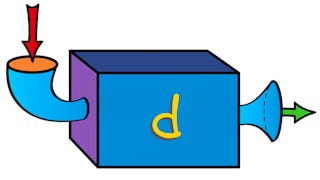This first course on concepts of single variable calculus will introduce the notions of limits of a function to define the derivative of a function. In mathematics, the derivative measures the sensitivity to change of the function. For example, the derivative of the position of a moving object with respect to time is the object's velocity: this measures how quickly the position of the object changes when time advances. This fundamental notion will be applied through the modelling and analysis of data.

Enjoy unlimited growth with a year of Coursera Plus for $199 (regularly $399). Save now.

Calculus through Data & Modeling: Limits & Derivatives
This course is part of Differential Calculus through Data and Modeling Specialization

Instructor: Joseph W. Cutrone, PhD
Top Instructor
8,917 already enrolled
Included with
(209 reviews)
Skills you'll gain
Details to know

Add to your LinkedIn profile
See how employees at top companies are mastering in-demand skills

Build your subject-matter expertise
- Learn new concepts from industry experts
- Gain a foundational understanding of a subject or tool
- Develop job-relevant skills with hands-on projects
- Earn a shareable career certificate

There are 6 modules in this course
One of the goals in studying Calculus is to analyze rates of change and movement. In this module, we introduce the central ideas which will help us achieve this goal: the notions of the limit and the derivative. Rather than evaluating a function at a single point, the limit allows for the study of the behavior of a function in an interval around that point. In this module, you will find limits of functions by a variety of methods, both visually and algebraically. Finally, we will apply limits to define the key idea of Differentiable Calculus, the derivative.
What's included
5 videos2 readings1 assignment
Using calculators or graphs is an imprecise way to find the limit of a function. In this module, we will state and use algebraic properties of limits, called the Limit Laws, to calculate the exact values of limits. A solid understanding of these laws will allow us to derive theorems which in turn can be used to study the behavior of more advanced functions.
What's included
3 videos1 reading1 assignment
In the last module, there were several types of functions where the limit of a function as x approaches a number could be found by simply calculating the value of the function at the number. Functions with this property will be called continuous and in this module, we use limits to define continuity. We will see that the mathematical definition of continuity will correspond closely with the English meaning of the word continuity used in every day language.
What's included
3 videos2 readings1 assignment
In this module, we allow for x to become arbitrarily large in the positive or negative direction to understand the end-behaviors of functions. This will allow for the formal definition of a horizontal asymptote and to provide classifications of end-behavior of certain types of functions.
What's included
1 video2 readings1 assignment
The problem of finding the slope of the tangent line to a curve and the problem of finding the instantaneous velocity of an object both involve finding the same type of limit. This special type of limit is called the derivative and in this module, we will see that this notion of the derivative can be interpreted as a rate of change in any of the natural or social sciences or engineering.
What's included
7 videos2 readings1 assignment
In this final project, we will apply the tools and language of differentiable calculus to analyze trends in data. This project will focus on modelling and analyzing gender ratios in educational attainment over time in several regions of the world.
What's included
1 peer review
Earn a career certificate
Add this credential to your LinkedIn profile, resume, or CV. Share it on social media and in your performance review.
Instructor

Offered by
Explore more from Math and Logic
 Status: Free Trial
Status: Free TrialJohns Hopkins University
 Status: Free Trial
Status: Free TrialJohns Hopkins University
 Status: Preview
Status: PreviewPolitecnico di Milano
 Status: Free
Status: FreeUniversity of Pennsylvania
Why people choose Coursera for their career




Learner reviews
209 reviews
- 5 stars
83.73%
- 4 stars
10.52%
- 3 stars
3.34%
- 2 stars
0.95%
- 1 star
1.43%
Showing 3 of 209
Reviewed on Mar 3, 2024
Significantly easier than the previous one in the specialization
Reviewed on May 31, 2021
Loved the course. Prof Cutrone is a great teacher!!!
Reviewed on Mar 15, 2022
Videos were clear and practice questions were challenging but rewarding.

Open new doors with Coursera Plus
Unlimited access to 10,000+ world-class courses, hands-on projects, and job-ready certificate programs - all included in your subscription
Advance your career with an online degree
Earn a degree from world-class universities - 100% online
Join over 3,400 global companies that choose Coursera for Business
Upskill your employees to excel in the digital economy
Frequently asked questions
To access the course materials, assignments and to earn a Certificate, you will need to purchase the Certificate experience when you enroll in a course. You can try a Free Trial instead, or apply for Financial Aid. The course may offer 'Full Course, No Certificate' instead. This option lets you see all course materials, submit required assessments, and get a final grade. This also means that you will not be able to purchase a Certificate experience.
When you enroll in the course, you get access to all of the courses in the Specialization, and you earn a certificate when you complete the work. Your electronic Certificate will be added to your Accomplishments page - from there, you can print your Certificate or add it to your LinkedIn profile.
Yes. In select learning programs, you can apply for financial aid or a scholarship if you can’t afford the enrollment fee. If fin aid or scholarship is available for your learning program selection, you’ll find a link to apply on the description page.
More questions
Financial aid available,
¹ Some assignments in this course are AI-graded. For these assignments, your data will be used in accordance with Coursera's Privacy Notice.

